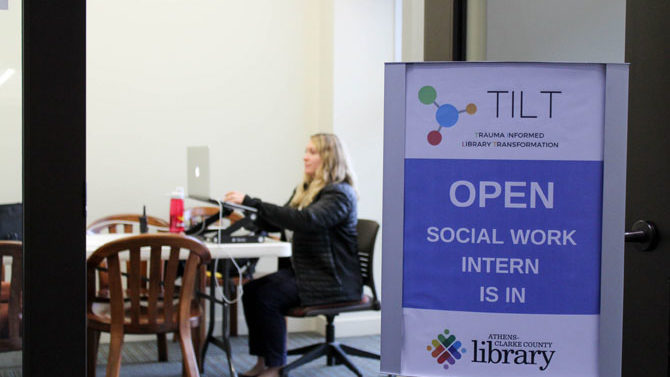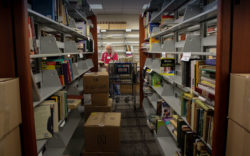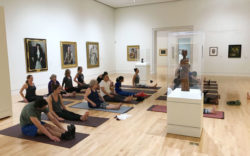Athens-Clarke County now has one of the first “trauma-informed” libraries in the country, where employees are trained to recognize patrons who need help and direct them to services.
“Athens is a remarkable city, yet it also faces extraordinary disparities and social risk factors,” says program coordinator Caroline Sharkey. The ACC Library is a hub of activity at any given moment, buzzing with individuals from all walks of life, seeking the library and its resources for any number of reasons. About 350,000 people a year come through its doors.
“The ACC Library is pivotal in helping to bridge the myriad of resources available to people, and now it can help connect people to another arena of social resources,” Sharkey says. “TILT is helping to bring attention to ways that organizations that are not typically associated with behavioral and mental health can incorporate a new awareness to improve services.”
TILT, the program Sharkey directs, is an acronym for Trauma-Informed Library Transformation. Last August, the ACC Library won the Community Catalyst National Leadership Grant from the Institute of Museum and Library Services (IMLS). The library received one of 12 grants awarded among 51 applicants, says Donna Brumby, assistant director for organizational development at the Athens Regional Library System. This two-year grant funds both a peer mentoring outreach program as well as a two-pronged approach towards making the ACC Library one of the first libraries in the nation where the staff is entirely trauma-informed.
Trauma is broadly defined by experts as anything that affects a person’s physical or mental well-being. It can be acute (such as a car accident or natural disaster) or chronic (child abuse or domestic violence). Racism can also be traumatic for individuals who experience it.
According to the Substance Abuse and Mental Health Services Administration, being trauma-informed means that an organization understands the impact of trauma, the signs and symptoms of someone struggling and is able to respond with policies, practices and procedures that “actively resist re-traumatization.”
That basically means the library’s staff will be able to assist with a better frame of reference. “When they see patrons who are struggling, or even engaging in behaviors that might be viewed as problematic or disruptive, library staff will understand that the behaviors might be the result of trauma,” says Anna Scheyett, dean UGA’s School of Social Work, which is working with the library. “They will understand how best to respond to people who have experienced trauma in a way that is respectful, welcoming, non-judgmental and, most importantly, that doesn’t shame or re-traumatize someone.”
Staff training is merely the first prong of this process. Since September 2018, three social-work interns have been stationed in the library. They began by doing background research and canvassing the library to assess how trauma-informed it already was and what needed improvement. For example, even the books that are on display will be trauma-informed, which also means being inclusive of all the types of cultures and experiences.
“On any given day, individuals from all walks of life use the library for their needs,” says social work intern Lydia Hawkins. “I think it was a natural transition for the library to seek out a way to implement this additional service that was being requested regularly by patrons expressing social service needs.”
The interns have also been conducting community outreach to various organizations around Athens, compiling a mega-resource with names of specific people to contact. Rather than just pointing people in the direction of a service that they may have tried before, the interns can actually help them contact a specific person with what’s known as a warm referral.
Located on the second floor of the library, behind the computers, the interns have an office space where they can meet with patrons on Mondays, Wednesdays, Thursdays and Fridays (according to their current schedule).
“With their efforts, we have been able to [reach out] to local community organizations providing and attending to social service needs to identify ways we can connect patrons to available resources, make more visible services and identify ways that we can help provide limited case management to ensure people using the library have the fullest experience possible,” Sharkey says.
To list all that the ACC Library offers would be impossible—its mission statement of providing “information and resources which address the needs of the community” reaches beyond just books. “Honestly, every grant we receive has a positive impact on our ability to provide library services to our communities,” says Brumby.
Despite the two-year funding from this particular grant, there’s always another grant out there that will help the library continue its mission of being trauma-informed—and perhaps find a way to staff a full-time social worker. “They’ve had great success in winning national grants that allow them to try innovative services,” says Julie Walker, previously a librarian at the ACC Library for 13 years before moving to the state level as Georgia’s current state librarian. “They excel in creating partnerships with other community agencies. Their staff is strong, creative, enthusiastic and committed,” she says.
It takes a small army of people to apply for these grants, and the team effort extends into the implementation of the grants’ use, as well. “I think the closely matched educational missions of public schools, schools of higher learning and public libraries make these partnerships natural, especially in a university town like Athens,” Brumby says.
The collaboration between the library and the School of Social Work is the first of its kind, one that allows social work interns to learn while also creating this organizational framework for the library, Sharkey says.
“It just seems to me that is it a perfect blend of what the library wants to do—be a welcoming and respectful place for all that helps people find information they need—and what we want to do as a school: be embedded in the community, working in partnership to find novel solutions to problems, through our teaching and our research,” says Dean Scheyett.
The third and final part of this grant is the implementation of the B.E.E. Club (Becoming Empowered through Education), a peer mentoring outreach program for high-school girls. This particular aspect of the grant is bringing the library’s mission and resources to the community.
“The Athens Regional Library System, like the B.E.E. Club, is a place where everyone belongs. This partnership not only means that the library gets to strengthen its engagement within the community, but it also means that the library gets to do it in a way that is supportive and inclusive of its own mission and values,” says Akilah Blount, the community catalyst consultant who is spearheading the program.
“The B.E.E. Club creates a safe space for girls to belong, while also increasing girls’ access to education in life skills, leadership, youth advocacy, diversity and inclusivity,” says Blount. The recent UGA graduate actually worked on this program in Atlanta at Westlake High School, and thanks to her experience and previous internship at the library, and the 2018 IMLS grant, she has been able to bring this program to Cedar Shoals High School.
“I have long stated proudly that the public library is the one government agency that exists to serve every resident,” says Brumby. “One’s age, income, education, skill level, interests or abilities do not matter—the library is here to help everyone.”
Like what you just read? Support Flagpole by making a donation today. Every dollar you give helps fund our ongoing mission to provide Athens with quality, independent journalism.









